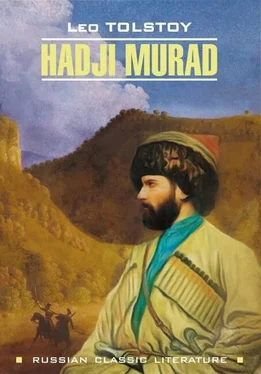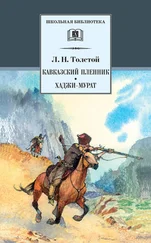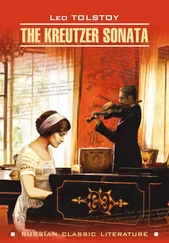Loris-Melikov, who spoke Tartar fluently, told him that though the prince knew about his past life, he yet wanted to hear the whole story from himself.
Tell it me, and I will write it down and translate it into Russian and the prince will send it to the Emperor.”
Hadji Murad remained silent for a while (he never interrupted anyone but always waited to see whether his interlocutor had not something more to say), then he raised his head, shook back his cap, and smiled the peculiar childlike smile that had captivated Marya Vasilevna.
“I can do that,” said he, evidently flattered by the thought that his story would be read by the Emperor.
“Thou must tell me” (in Tartar nobody is addressed as “you”) “everything, deliberately from the beginning,” said Loris Melikov drawing a notebook from his pocket.
“I can do that, only there is much – very much – to tell! Many events have happened!” said Hadji Murad.
“If thou canst not do it all in one day thou wilt finish it another time,” said Loris-Melikov.
“Shall I begin at the beginning?”
“Yes, at the very beginning … where thou wast born and where thou didst live.”
Hadji Murad’s head sank and he sat in that position for a long time. Then he took a stick that lay beside the divan, drew a little knife with an ivory gold-inlaid handle, sharp as a razor, from under his dagger, and started whittling the stick with it and speaking at the same time.
“Write: Born in Tselmess, a small aoul, ‘the size of an ass’s head,’ as we in the mountains say,” he began. “not far from it, about two cannon-shots, lies Khunzakh where the Khans lived. Our family was closely connected with them.
“My mother, when my eldest brother Osman was born, nursed the eldest Khan, Abu Nutsal Khan. Then she nursed the second son of the Khan, Umma Khan, and reared him; but Akhmet my second brother died, and when I was born and the Khansha bore Bulach Khan, my mother would not go as wet-nurse again. My father ordered her to, but she would not. She said: I should again kill my own son, and I will not go.’ Then my father, who was passionate, struck her with a dagger and would have killed her had they not rescued her from him. So she did not give me up, and later on she composed a song … but I need not tell that.”
“Yes, you must tell everything. It is necessary,” said Loris-Melikov.
Hadji Murad grew thoughtful. He remembered how his mother had laid him to sleep beside her under a fur coat on the roof of the saklya, and he had asked her to show him the place in her side where the scar of her wound was still visible.
He repeated the song, which he remembered:
“My white bosom was pierced by the blade of bright steel,
But I laid my bright sun, my dear boy, close upon it
Till his body was bathed in the stream of my blood.
And the wound healed without aid of herbs or of grass.
As I feared not death, so my boy will ne’er fear it.”
“My mother is now in Shamil’s hands,” he added, “and she must be rescued.”
He remembered the fountain below the hill, when holding on to his mother’s sarovary (loose Turkish trousers) he had gone with her for water. He remembered how she had shaved his head for the first time, and how the reflection of his round bluish head in the shining brass vessel that hung on the wall had astonished him. He remembered a lean dog that had licked his face. He remembered the strange smell of the lepeshki (a kind of flat cake) his mother had given him – a smell of smoke and of sour milk. He remembered how his mother had carried him in a basket on her back to visit his grandfather at the farmstead. He remembered his wrinkled grandfather with his grey hairs, and how he had hammered silver with his sinewy hands.
“Well, so my mother did not go as nurse,” he said with a jerk of his head, “and the Khansha took another nurse but still remained fond of my mother, and my mother used to take us children to the Khansha’s palace, and we played with her children and she was fond of us.
“There were three young Khans: Abu Nutsal Khan my brother Osman’s foster-brother; Umma Khan my own sworn brother; and Bulach Khan the youngest – whom Shamil threw over the precipice. But that happened later.
“I was about sixteen when murids began to visit the aouls. They beat the stones with wooden scimitars and cried Mussulmans, Ghazavat 20 20 Ghazavat – a holy war against the infidels
!’ The Chechens all went over to Muridism and the Avars began to go over too. I was then living in the palace like a brother of the Khans. I could do as I liked, and I became rich. I had horses and weapons and money. I lived for pleasure and had no care, and went on like that till the time when Kazi-Mulla, the Imam 21 21 Imam – the leader in the holy war, uniting in himself supreme spiritual and temporal power
, was killed and Hamzad succeeded him. Hamzad sent envoys to the Khans to say that if they did not join the Ghazavat he would destroy Khunzakh.
“This needed consideration. The Khans feared the Russians, but were also afraid to join in the Holy War. The old Khansha sent me with her second son, Umma Khan, to Tiflis to ask the Russian Commander-in-Chief for help against Hamzad. The Commander-in-Chief at Tiflis was Baron Rosen. He did not receive either me or Umma Khan. He sent word that he would help us, but did nothing. Only his officers came riding to us and played cards with Umma Khan. They made him drunk with wine and took him to bad places, and he lost all he had to them at cards. His body was as strong as a bull’s and he was as brave as a lion, but his soul was weak as water. He would have gambled away his last horses and weapons if I had not made him come away.
“After visiting Tiflis my ideas changed and I advised the old Khansha and the Khans to join the Ghazavat… .“
What made you change your mind?” asked Loris-Melikov. “Were you not pleased with the Russians?”
Hadji Murad paused.
“No, I was not pleased,” he answered decidedly, closing his eyes. “and there was also another reason why I wished to join the Ghazavat.”
“What was that?”
“Why, near Tselmess the Khan and I encountered three murids, two of whom escaped but the third one I shot with my pistol.
“He was still alive when I approached to take his weapons. He looked up at me, and said, Thou has killed me … I am happy; but thou are a Mussulman, young and strong. Join the Ghazavat! God wills it!’”
“And did you join it?”
“I did not, but it made me think,” said Hadji Murad, and he went on with his tale.
“When Hamzad approached Kunzakh we sent our Elders to him to say that we would agree to join the Ghazavat if the Imam would sent a learned man to explain it to us. Hamzad had our Elders’ mustaches shaved off, their nostrils pierced, and cakes hung to their noses, and in that condition he sent them back to us.
“The Elders brought word that Hamzad was ready to send a sheik to teach us the Ghazavat, but only if the Khansha sent him her youngest son as a hostage. She took him at his word and sent her youngest son, Bulach Khan. Hamzad received him well and sent to invite the two elder brothers also. He sent word that he wished to serve the Khans as his father had served their father… . The Khansha was a weak, stupid, and conceited woman, as all women are when they are not under control. She was afraid to send away both sons and sent only Umma Khan. I went with him. We were met by murids about a mile before we arrived and they sang and shot and caracoled around us, and when we drew near, Hamzad came out of his tent and went up to Umma Khan’s stirrup and received him as a Khan. He said, I have not done any harm to thy family and do not wish to do any. Only do not kill me and do not prevent my bringing the people over to the Ghazavat, and I will serve you with my whole army as my father served your father! Let me live in your house and I will help you with my advice, and you shall do as you like!’
Читать дальше
Конец ознакомительного отрывка
Купить книгу












